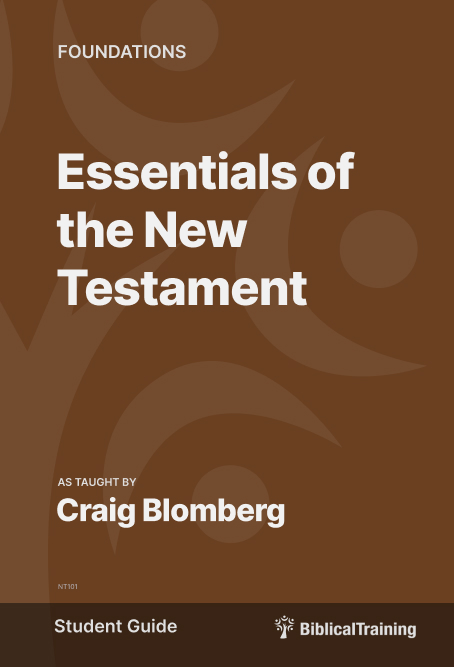Essentials of the New Testament
About This Class
Dr. Craig Blomberg begins with a discussion of why this topic is important, he moves into New Testament backgrounds, how we received our Bible, a summary of all four gospels, and then on to the letters of Paul and others.
Craig Blomberg

Lessons
There are many reasons why studying the Bible is informative and profitable. Effective approaches you use to study the New Testament will take into account questions of introduction, exegesis, theology and application. Your conclusions will be affected by your presuppositions and the extent to which you allow your previous knowledge and life experience to be part of the process. (45 min.)
0% CompleteThe nations that controlled the nation of Israel prior to and during the writing of the New Testament affected the political and cultural climate in which it was written. The influence of the Greek religion and the relationship between Jews and Gentiles is an underlying theme throughout the New Testament. Roman rule in Israel and the destruction of the temple in Jerusalem in A.D. 70 are significant to both Judaism and Christianity. The four main groups in Judaism were the Pharisees, Sadducees, Essenes, and Zealots. (38 min.)
0% CompleteHow and why were the books in the New Testament chosen to form the canon we have today? The three major criteria are that the writings be widely accepted, non-contradictory with previously acknowledged revelation and genuinely going back to an apostle or close associate of an apostle. The four Gospels have similarities and differences in their content and writing style. Matthew, Mark and Luke have so many similarities that they are called the Synoptic Gospels. John is significantly different in content and style from the other three. (47 min.)
0% Complete- 0% Complete
This lesson is an introduction and overview to each of the four Gospels. We’ll look at the term, gospel, and the genre of gospel. Understanding the circumstances surrounding the writing of each Gospel helps us better understand the central themes of each book. We’ll look at the major themes of each book and how to apply them. (42 min.)
0% Complete - 0% Complete
By comparing the texts of the Gospels, we can trace the major periods, activities and teachings of Jesus' life. Matthew and Luke describe events surrounding Jesus' birth and childhood. We can trace major events in the life and ministry of Jesus by following the order of events in the Gospel of Mark. (46 min.)
0% Complete - 0% Complete
The public ministry of Jesus, also described as the "Great Galilean" ministry, is described in different ways in all four Gospels. After his public ministry, there was a phase in which the ministry of Jesus is characterized by growing rejection of him, leading to his death and resurrection. (49 min.)
0% Complete The events surrounding the arrest, trial, crucifixion, and resurrection of Jesus, and an introduction to the book of Acts. (36 min.)
0% CompleteA summary of the book of Acts beginning with the third major section starting at Acts 9:32. Also, a summary of the background and contents of Galatians and 1 Thessalonians. (39 min.)
0% Complete- 0% Complete
A major theme in Second Thessalonians is "the Day of the Lord." There are common themes and teachings in First and Second Thessalonians. First Corinthians emphasizes the themes of Jesus' death and resurrection, as well as the importance and use of spiritual gifts, and how we conduct ourselves in relation to those who are pursuing Christ and those who are not. (45 min.)
0% Complete The outline and summary of the content of 2 Corinthians includes themes like financial stewardship and Christians being "ambassadors of reconciliation." Romans finds its theme in 1:16-17, the Gospel is the power of God for salvation for both Jews and Greeks. The books of Ephesians, Philippians, Colossians and Philemon are known as the "Prison Epistles." (50 min.)
0% CompleteCommon themes and applications from the Prison Epistles and the Pastoral Epistles are theologically significant as well as practical in their application in daily life. Hebrews emphasizes Jesus as the great High Priest and includes warning passages against committing apostasy. James emphasizes the relationship between faith and works in a way that complements what Paul writes in his letters, even though it sometimes seems contradictory at first. (52 min.)
0% Complete- 0% Complete
A dominant theme of the book of First Peter is how to live during times of suffering, particularly when that suffering is a result of being persecuted for your faith. The messages in Revelation for seven specific churches are also relevant for churches and individuals today. Much of Revelation is written in an apocalyptic style and contains imagery of the last days. (51 min.)
0% Complete
Class Resources
Recommended Books
Understanding the New Testament - Student Guide
This course is an overview of the content and themes of the New Testament by Dr. Craig Blomberg. Beginning with a discussion of why this topic is important, he moves into...
